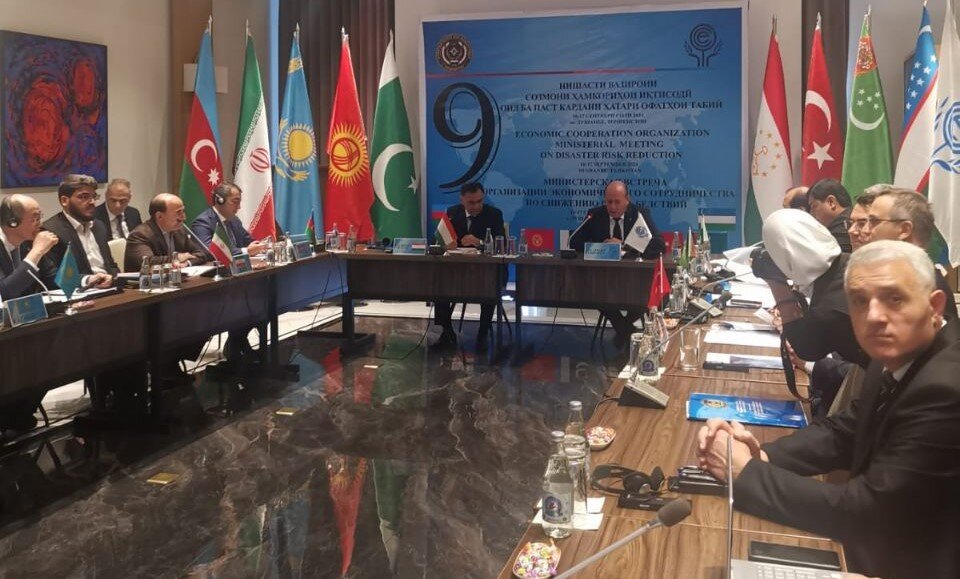ECO meeting: Iran suggests reinforcing cooperation can improve crisis management

TEHRAN –The head of the crisis management organization has said reinforcing cooperation among the ECO member states in prediction, prevention, preparation, response, reconstruction, and rehabilitation fields can greatly boost the efficiency of crisis management.
“Currently, the world is facing severe challenges, the most important of which include climate change, water scarcity (particularly fresh and safe water), lack of green spaces, and desertification, IRNA quoted Mohammad-Hassan Nami as saying.
He made the remarks at the 9th ECO Ministerial Meeting on Disaster Risk Reduction which was held on September 17 in Dushanbe. The event was hosted by the Committee of Emergency Situations and Civil Defense of Tajikistan.
The Ministers and Heads of Delegation from Azerbaijan, Iran, Kazakhstan, Pakistan, Turkey, and Turkmenistan, alongside regional and international organizations, gathered to discuss and review the ECO Regional Framework on Disaster Risk Reduction (ECORFDRR) and its implementation roadmap established for 2021-2025 as well as to adopt Dushanbe Declaration on DRR.
Addressing the meeting, the official said, “Since about a century ago, greenhouse gas emissions by the industrialized countries such as the United States, China, France, Germany, Japan, South Korea, England, and Australia have intensely changed the weather with growing disastrous consequences affecting the world.”
The world has no choice but to control and curb annual greenhouse gas emissions, and the aforementioned governments need to spend part of their revenues on green space maintenance and development, Nami further noted.
In this regard, the plan to plant one billion fruitful trees compatible with each specific region in Iran started last year and is scheduled to be implemented over 4 years.
Regarding the availability of valuable technologies in crisis management, Nami proposed the appropriate use of intelligent systems for correct data analysis to be put on the agenda to further advance the goals of the countries.
The official noted that access to authentic and reliable information related to risks is the basis for making quick, accurate, effective, and timely decisions in handling emergency situations and reducing financial and life losses. However, a substantial part of the risks is not limited to geographical borders.
It is essential for ministries and emergency organizations of the ECO member countries to act in the form of coherent information systems and intelligent systems to timely analyze and evaluate data, and issue warnings to responsible organizations.
In this regard, Iran has made a centralized and coordinated effort to identify risk data nationally and share it with the executive bodies of the country. Consequently, the country has gained successful experiences in the management of earthquake risk reduction, flood control, subsidence, landslide, water stress, drought and frost, fire, fine dust, cold, and heat waves, Nami added.
Regarding the fact that parts of the ECO member states are located in arid and desert regions, it is critical to enhance collaborations on implementing effective measures to address the following issues:
Preparing regional geological risk maps; managing shared water resources to prevent the disruption of the regional ecosystem; training and conducting joint governmental and community-oriented practices and maneuvers; establishing a joint expert group to cooperate activities among members, reinforcing cooperation in forecasting weather conditions, issuing early warnings and rapid response; as well as sharing new technologies.
Residing in disaster-prone regions, the ECO member states are exposed to numerous damages and losses from natural hazards. Therefore, the establishment of a fund to be used for coordinated, cross-border, and comprehensive actions needs to be put on the agenda, Nami highlighted.
Referring to the promotion of the economic resilience of the member states as one of the main goals of the organization, the official announced Iran’s readiness to hold regional training courses to build capacity and boost cooperation in responding to transboundary risks, including sand and dust, water resources management, fire as well as other hazards.
The 9th ECO Ministerial Meeting on DRR
Based on global priorities, the ministers underscored the necessity of capacity building, research, and international collaboration to foster a multi-hazard approach to disaster risk management.
They discussed innovative solutions such as early warning systems and data analytics, recognizing the critical role of leveraging technology to mitigate risks, introducing achievements, identifying areas for further attention, and highlighting the importance of coordinated efforts among ECO Member States.
The meeting also considered to establish a regional technical expert group dedicated to updating the framework for 2025-2030, emphasizing a commitment to enhancing disaster resilience across the region.
During the meeting, the United Nations Children's Fund (UNICEF) emphasized the imperative of child protection within disaster risk reduction strategies, advocating for enhanced cooperation and coordination among ECO member states.
The organization stressed that prioritizing children’s safety and well-being is essential in disaster preparedness and response efforts and highlighted that this collaborative approach adopted during the meeting marks a significant step toward ensuring that vulnerable populations, especially children, are safeguarded against the impacts of disasters, thereby fostering a resilient future for the entire region.
Highlighting the recommendations and decisions made in the Dushanbe Declaration, the meeting reaffirmed commitments to fostering regional cooperation and enhancing the capacity to mitigate disaster risks.
MT/MG
